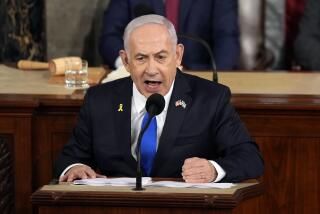Deal for Saudis to Buy 61 U.S. Passenger Jets Is Finalized : Aerospace: The sale will be divided between Boeing and McDonnell Douglas and will provide work for about 100,000.
Trumpeting the domestic economic gains, the White House Thursday announced the final signing of a long-awaited deal for the sale of 61 American-built commercial jetliners to Saudi Arabia for $6 billion.
The sale, which has been in the works for more than two years, will be divided between Seattle-based Boeing Co. and McDonnell Douglas Corp., whose Douglas Aircraft Co. division builds commercial planes in Long Beach.
“The aircraft,” the White House said in a statement, “will provide work for approximately 100,000 employees at Boeing, McDonnell Douglas and subcontractors throughout the United States.”
President Clinton was showered with enthusiastic accolades for overseeing the deal, which was signed Wednesday night by the aircraft contractors and Sultan ibn Abdulaziz, the Saudi defense minister. The White House made the announcement after the President and the Saudi minister met in the White House Thursday morning.
“We have worked very, very hard to make the case for the sale,” White House Press Secretary Mike McCurry said. “It’s a sale in which the White House and the President justifiably take a great amount of pride.”
As expected, Saudi Arabia’s national carrier Saudia will buy 33 planes from McDonnell Douglas--29 MD-90 single-aisle passenger airliners, and four MD-11 cargo planes. The carrier also will purchase 23 of Boeing’s new 777s and five of its 747s.
The aircraft will be delivered during the next five years with the first planes scheduled to enter service in 1997.
Douglas Aircraft, which has about 9,500 workers building commercial jets in Long Beach, reiterated that the Saudi order would not by itself generate significant numbers of new jobs, but that it would help prevent layoffs.
“We expect that this order will fill in our production line starting next year, and that will help keep our employment here firm,” said Douglas spokesman Don Hanson.
Boeing Chairman Frank Shrontz likewise said the Saudi sale will not “in and of itself” mean more jobs at his company, but that it would “provide stability in our employment.” Boeing’s production workers currently are on strike over a contract dispute.
Although details of the Saudi deal had been known since last summer, the formal order still represents the second major victory this month for Harry Stonecipher, who became McDonnell Douglas’ president and chief executive a year ago.
Stonecipher, a former jet-engine salesman, had vowed to build up McDonnell’s flagging commercial jetliner business, which has dropped to a distant third in the industry behind Boeing and Airbus Industrie of Europe.
Earlier this month, McDonnell defeated those rivals and others to win a $1-billion contract from ValuJet Airlines for 50 of McDonnell’s new MD-95, enabling the company to formally launch production of the 100-seat aircraft in Long Beach.
“I’m sure this Saudi order was a hard-fought one as well, and now Stonecipher has got the momentum,” said Paul Nisbet, an analyst at JSA Research Inc., an aerospace consulting firm in Newport, R.I.
The original announcement promising a Saudi deal was made by Clinton in the fall of 1994, but continued negotiations and Saudi fiscal problems delayed completion of the pact.
During that time, according to McCurry, the President made personal appeals to Saudi Arabia’s King Fahd and others and “spent a fair amount of time in correspondence” with key Saudis in order to seal the agreement.
The Administration “has worked tirelessly to ensure a successful outcome of contract negotiations,” McCurry said, and Boeing’s Shrontz told reporters that the President proved “a very persuasive individual.”
Sultan ibn Abdulaziz, the Saudi defense minister, said the sale “is important for the Saudi airline because we are going to privatize it soon, and this will make it a very advanced airline.”
In the meeting in the Oval Office, Clinton told the defense minister that he appreciated “Saudi Arabia’s vote of confidence in the quality and competitiveness of America’s aerospace industry,” McCurry said.
McCurry described the deal as “a major success for the American aerospace industry” and said that Saudi-American relations in commercial aviation date back half a century to a meeting of President Franklin D. Roosevelt and King Abdulaziz ibn Saud.
The major subcontractors on the Saudi aircraft sale include jet-engine manufacturers Pratt & Whitney, a unit of United Technologies Corp., and General Electric Co. Work will also be farmed out to Boeing and McDonnell Douglas operations in Missouri, Kansas, Arkansas and Utah, according to the White House.
Meisler reported from Washington and Peltz from Los Angeles.
More to Read
Inside the business of entertainment
The Wide Shot brings you news, analysis and insights on everything from streaming wars to production — and what it all means for the future.
You may occasionally receive promotional content from the Los Angeles Times.











